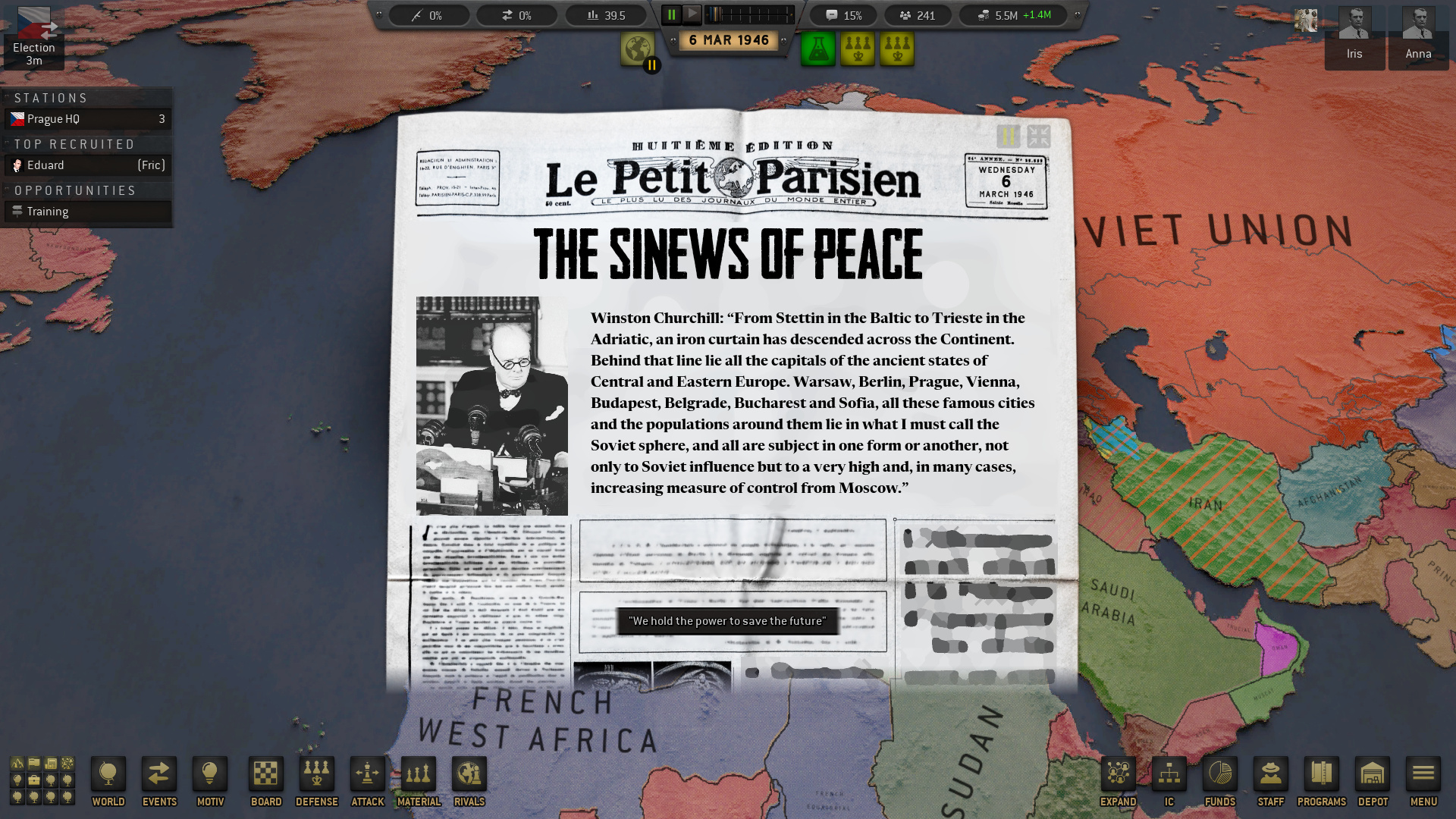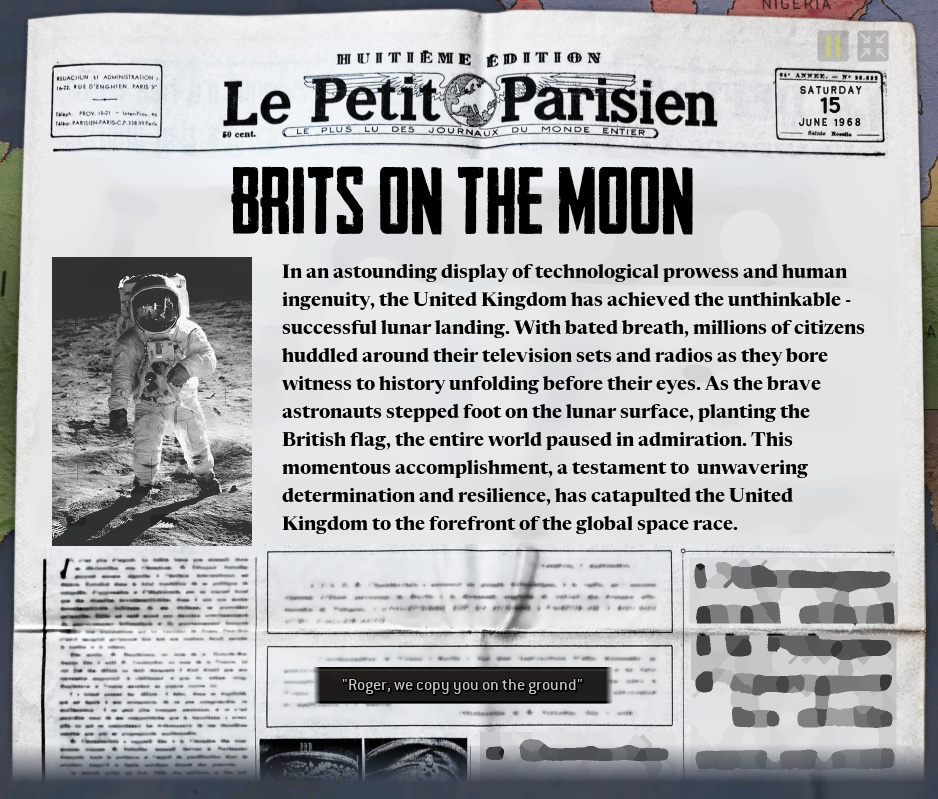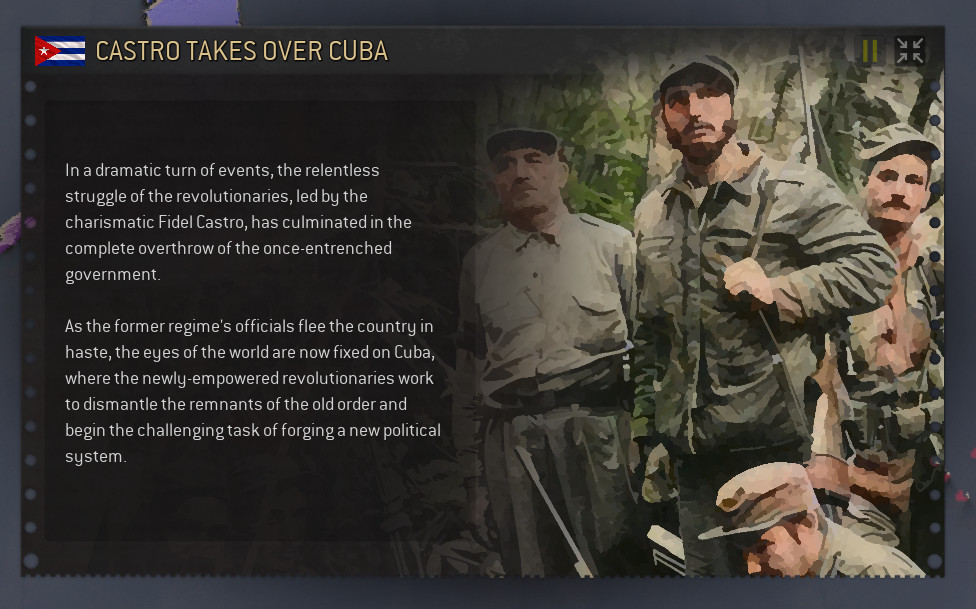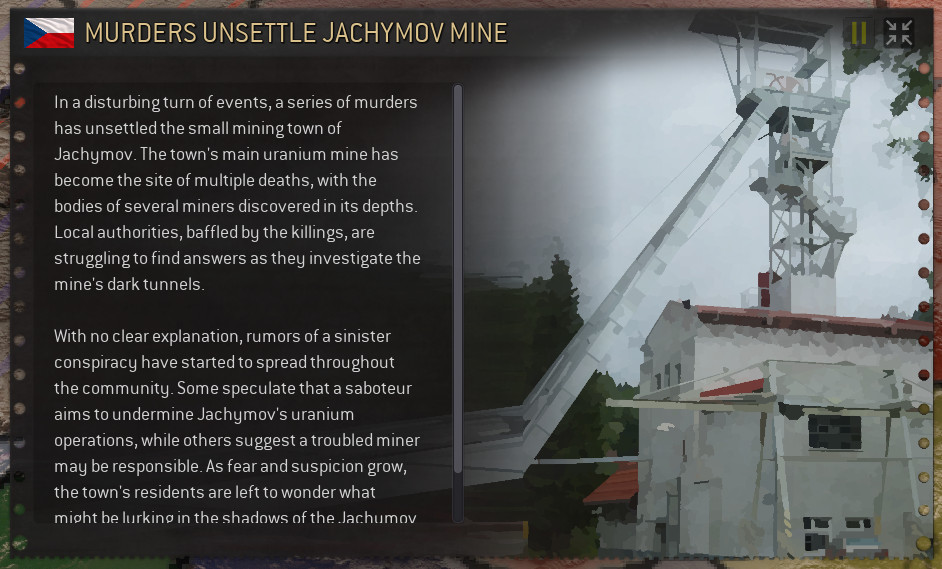Dev Diary #46 - Coup d'etat ⚔️
What's happening / TLDR: Developer diaries introduce details of Espiocracy - Cold War strategy game in which you play as an intelligence agency. You can catch up with the most important dev diary (The Vision) and find out more on Steam page.
---
Coup d'état - planned, rapid, often violent take over of a government - has everything to inspire entire fascinating video games. A modern coup with our lethal weapons, mass media, and means of transport is almost caricaturally perfect set-up, to the point of nailing classical Greek unity of place, action, and time. However, there are no such games. At best, a few games have tangential single-button-mechanics representing a coup. Even in the realm of board games there are no contenders, as the only few serious takes went out of print decades ago. One can wonder, what is so unappealing here to authors, and does it extend to the audience? Is it related to the lack of video games about the Cold War?
Similarly to many other avenues explored by this game, such as interesting espionage mechanics or strong AI players, coups seem to be locked behind an initial leap which for many may be too unintuitive and experimental.
This particular leap has to happen on day zero and dictates the shape of entire game. You are not a government or a country leader or a spirit of the nation to i.a. enable meaningful coups. You are dealing with dynamic sets of political actors to i.a. arrest or assassinate anyone. You are an intelligence community to i.a. be fully immersed in covert plots. You constantly stab boundaries of treason and patriotism - to be close to actual stakes behind coups.
In a way, Espiocracy is that coup d'état game we were trying to find in the first paragraph. To be more precise, a game of almost 200 coups during the Cold War and 200 significant failed attempts. Let's jump into a few initial examples and associated gameplay.
[h2]France, 1947[/h2]

Tense political situation, militant actors, and neutrality or support of military leadership are the main ingredients of most coups. France begins the game in such position with local communist (Stalinist!) party as a natural potential coup plotter.
(It's not a secret or benefit of hindsight. In real life, CIA informed Truman month after month in 1946 about suspected coup plots in France. Local contemporaries also suspected the party of more violent plans which partially materialized in 1947, for instance in morbid episode where 21 people were killed in train sabotage.)
Any political or military actor is capable of launching a coup plot after attaining enough influence (depending on the local strength of the political system). As with any action of an actor, it can be discovered via operational gameplay. Here, we detect communist plot in France from the perspective of Spanish intelligence services.

Once discovered, a third-party player may dedicate additional resources and influence the coup. For now, we'll leave it for itself, simply gathering intelligence along the way.
On surface, a coup is political process in the game sharing some characteristics with all the other processes, such as elections or succession. However, its actual progress and success hinges on unusual factors, such as securing weapons and loyal people, finding opportunity to strike, or securing legitimacy in the eyes of local population. As with the beginning of a civil war, single events can become the final straw. For a really successful coup it has to be a chain of such events (intervention of Indochina, removal from the cabinet, communist victory in Italy, strikes followed by violent crackdown) which, as is the leitmotiv for entire games, depends on orchestra of many actors, players, and covert machinations. Could communists nudge France into colonial war to reap the wind of discontent?
After everything is in place, the coup is executed with the use of simulation engine. From the perspective of a third country, coup execution can be observed tick-by-tick or simply summarized in a report.

A coup, obviously, has significant personal consequences both for deposed and deposing actors. Beyond that, new actors can steer country into new direction - France rejecting Marshall plan and approaching Cominform - while also changing local intelligence community by purging anti-communist operatives. Internationally, nations may reject legitimacy of the new government (including casus belli) or, on the opposite end of spectrum, provide substantial aid to new provisional government.
[h2]Turkey, 1950[/h2]
Coups, naturally, do not happen exclusively "naturally". Sometimes, they are staged directly by intelligence agencies. From the perspective of the American player, we look for a useful candidate in Europe.

In this timeline, entire southeastern Europe was not able to resist the wave of communism. Turkey, a country with popular anti-communist views is a good country to try gaining a foothold in the region. After building our local empire of influence...

...we can choose one of the partially controlled actors for potential plot. Although it's ultimately decision and responsibility of an actor (who/which can start doubting along the way... or be pressed by another players), we are capable of nudging anyone into any action given enough leverage.

By further providing support in the form of smuggled material, suppressing communist political police, staging opportunities to strike, we're able to push the plot enough to have it succeed.

The rewards are very palpable: new significant country in our bloc, increase of our State Power Index, high penetration of its government, safe frontier to stage further operations in the region, and so on.
[h2]USA, 1950[/h2]
What happens when the coup is happening against your government? We'll jump straight into one of the most convoluted cases, an alternate USA with Republican Dewey in conflict with MacArthur over nuclear posture.

The USA is one of the best coup-proofed nations in the world. In the game, the country achieves it through:
A scenario where an actor would be capable of launching coup plot in the USA requires deterioration of above factors. It can happen even through external influences, for instance many KGB operations or a string of global crises. Once these start to coincide with controversial decisions and internal conflicts, local player may not only detect coup but also be burdened with full weight of difficult decisions: from directly supporting or sabotaging the plot, all the way to influencing cogs in the machine. Going along with the coup, on the one hand, can be a large plus for the new government. On the other hand, in the case of failure, it may lead to discovery of our past operations, trial, and finally game over condition: grand treason.

[h2]Behind The Scenes[/h2]
► Initial prototypes of the game featured coup d'etat as an intelligence operation. Over the last two years, it evolved into a actor-based mechanic focused on one-day palace coup. However, the game still retains blurry approach to such definitions and the player can pull off coup d'etat without developing explicit coup plot, for instance by killing or arresting governmental leader while the intended successor already waits next in line.
► Brian Train described all (!) games about coups in a short article which inspired him to create "Palace Coup" board game. Espiocracy is not exactly alone.
► Historical coups have immense depth and detail. Many of these interesting stories will trickle into the game over time of development, from French government hiring a mercenary to coup a small island nation who then escaped his funders to Gulenist coup plotters in supposedly using an online mobile game for covert communications.
[h2]Final Remarks[/h2]
It goes without saying that screenshots of a game in development contain many placeholders and are subject to change. Precise build of simulation engine for coups is not in satisfying enough state at the moment - we'll probably return to the topic in the future, along with exploration of more modern coups and more convoluted situations.
---
If you're not already wishlisting Espiocracy, consider doing it
https://store.steampowered.com/app/1670650/Espiocracy/
There is also a small community around Espiocracy:

---
"Chilean military’s amour propre would have been offended by the notion that they needed the U.S. to run the coup for them" - Kristian Gustafson
---
Coup d'état - planned, rapid, often violent take over of a government - has everything to inspire entire fascinating video games. A modern coup with our lethal weapons, mass media, and means of transport is almost caricaturally perfect set-up, to the point of nailing classical Greek unity of place, action, and time. However, there are no such games. At best, a few games have tangential single-button-mechanics representing a coup. Even in the realm of board games there are no contenders, as the only few serious takes went out of print decades ago. One can wonder, what is so unappealing here to authors, and does it extend to the audience? Is it related to the lack of video games about the Cold War?
Similarly to many other avenues explored by this game, such as interesting espionage mechanics or strong AI players, coups seem to be locked behind an initial leap which for many may be too unintuitive and experimental.
This particular leap has to happen on day zero and dictates the shape of entire game. You are not a government or a country leader or a spirit of the nation to i.a. enable meaningful coups. You are dealing with dynamic sets of political actors to i.a. arrest or assassinate anyone. You are an intelligence community to i.a. be fully immersed in covert plots. You constantly stab boundaries of treason and patriotism - to be close to actual stakes behind coups.
In a way, Espiocracy is that coup d'état game we were trying to find in the first paragraph. To be more precise, a game of almost 200 coups during the Cold War and 200 significant failed attempts. Let's jump into a few initial examples and associated gameplay.
[h2]France, 1947[/h2]

Tense political situation, militant actors, and neutrality or support of military leadership are the main ingredients of most coups. France begins the game in such position with local communist (Stalinist!) party as a natural potential coup plotter.
(It's not a secret or benefit of hindsight. In real life, CIA informed Truman month after month in 1946 about suspected coup plots in France. Local contemporaries also suspected the party of more violent plans which partially materialized in 1947, for instance in morbid episode where 21 people were killed in train sabotage.)
Any political or military actor is capable of launching a coup plot after attaining enough influence (depending on the local strength of the political system). As with any action of an actor, it can be discovered via operational gameplay. Here, we detect communist plot in France from the perspective of Spanish intelligence services.

Once discovered, a third-party player may dedicate additional resources and influence the coup. For now, we'll leave it for itself, simply gathering intelligence along the way.
On surface, a coup is political process in the game sharing some characteristics with all the other processes, such as elections or succession. However, its actual progress and success hinges on unusual factors, such as securing weapons and loyal people, finding opportunity to strike, or securing legitimacy in the eyes of local population. As with the beginning of a civil war, single events can become the final straw. For a really successful coup it has to be a chain of such events (intervention of Indochina, removal from the cabinet, communist victory in Italy, strikes followed by violent crackdown) which, as is the leitmotiv for entire games, depends on orchestra of many actors, players, and covert machinations. Could communists nudge France into colonial war to reap the wind of discontent?
After everything is in place, the coup is executed with the use of simulation engine. From the perspective of a third country, coup execution can be observed tick-by-tick or simply summarized in a report.

A coup, obviously, has significant personal consequences both for deposed and deposing actors. Beyond that, new actors can steer country into new direction - France rejecting Marshall plan and approaching Cominform - while also changing local intelligence community by purging anti-communist operatives. Internationally, nations may reject legitimacy of the new government (including casus belli) or, on the opposite end of spectrum, provide substantial aid to new provisional government.
[h2]Turkey, 1950[/h2]
Coups, naturally, do not happen exclusively "naturally". Sometimes, they are staged directly by intelligence agencies. From the perspective of the American player, we look for a useful candidate in Europe.

In this timeline, entire southeastern Europe was not able to resist the wave of communism. Turkey, a country with popular anti-communist views is a good country to try gaining a foothold in the region. After building our local empire of influence...

...we can choose one of the partially controlled actors for potential plot. Although it's ultimately decision and responsibility of an actor (who/which can start doubting along the way... or be pressed by another players), we are capable of nudging anyone into any action given enough leverage.

By further providing support in the form of smuggled material, suppressing communist political police, staging opportunities to strike, we're able to push the plot enough to have it succeed.

The rewards are very palpable: new significant country in our bloc, increase of our State Power Index, high penetration of its government, safe frontier to stage further operations in the region, and so on.
[h2]USA, 1950[/h2]
What happens when the coup is happening against your government? We'll jump straight into one of the most convoluted cases, an alternate USA with Republican Dewey in conflict with MacArthur over nuclear posture.

The USA is one of the best coup-proofed nations in the world. In the game, the country achieves it through:
- Large politically active population
- Strength of legal institutions
- Strict civil oversight of military
- Conscription
- Significant media actors, subactors, and sector
A scenario where an actor would be capable of launching coup plot in the USA requires deterioration of above factors. It can happen even through external influences, for instance many KGB operations or a string of global crises. Once these start to coincide with controversial decisions and internal conflicts, local player may not only detect coup but also be burdened with full weight of difficult decisions: from directly supporting or sabotaging the plot, all the way to influencing cogs in the machine. Going along with the coup, on the one hand, can be a large plus for the new government. On the other hand, in the case of failure, it may lead to discovery of our past operations, trial, and finally game over condition: grand treason.

[h2]Behind The Scenes[/h2]
► Initial prototypes of the game featured coup d'etat as an intelligence operation. Over the last two years, it evolved into a actor-based mechanic focused on one-day palace coup. However, the game still retains blurry approach to such definitions and the player can pull off coup d'etat without developing explicit coup plot, for instance by killing or arresting governmental leader while the intended successor already waits next in line.
► Brian Train described all (!) games about coups in a short article which inspired him to create "Palace Coup" board game. Espiocracy is not exactly alone.
► Historical coups have immense depth and detail. Many of these interesting stories will trickle into the game over time of development, from French government hiring a mercenary to coup a small island nation who then escaped his funders to Gulenist coup plotters in supposedly using an online mobile game for covert communications.
[h2]Final Remarks[/h2]
It goes without saying that screenshots of a game in development contain many placeholders and are subject to change. Precise build of simulation engine for coups is not in satisfying enough state at the moment - we'll probably return to the topic in the future, along with exploration of more modern coups and more convoluted situations.
---
If you're not already wishlisting Espiocracy, consider doing it
https://store.steampowered.com/app/1670650/Espiocracy/
There is also a small community around Espiocracy:

---
"Chilean military’s amour propre would have been offended by the notion that they needed the U.S. to run the coup for them" - Kristian Gustafson
























